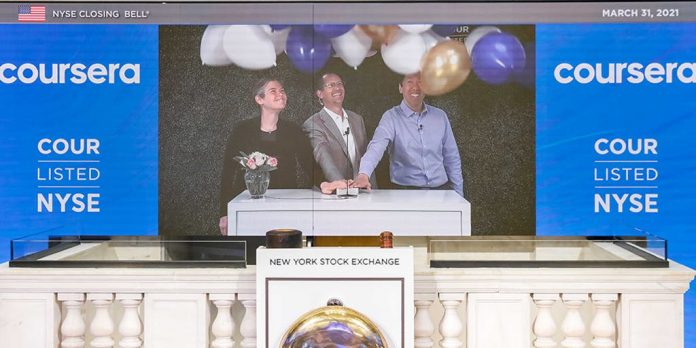Coursera’s founders and CEO rang the opening bell of the New York Stock Exchange today, as the online-learning company became a rare edtech enterprise to go public. And because it’s a pandemic, the event was online and the bell was virtual (perhaps fitting for an online-learning company).
Of course, the money the company is raising is very real—nearly $520 million. But what does the change mean for colleges and the higher ed landscape?
EdSurge talked with Coursera’s CEO, Jeff Maggioncalda, today to ask him what this unicorn company, valued at more than $3.6 billion according to PitchBook, plans to do now. Here are the takeaways:
Apparently Coursera went into the IPO with $275 million in the bank, bringing its total coffers to nearly three-quarters of $1 billion in cash, according to Maggioncalda.
What does it need all that for?
For one thing, more robot teaching-tech behind the scenes.
“We are always building more AI into the teaching experience and the learning experience,” he said. “On the learning side, that means more personalized learning. On the teaching side, [it means] improved student-success dashboards that predict every student’s grade every day and predict the chance that students stop [out of] the degree program.”
He said the influx will also help expand the platform’s integration with learning-management systems.
It’s worth noting that despite all the investment, the company still is not profitable.
The company started nine years ago amid a hype around free MOOCs, or massive open online courses, some of which drew hundreds of thousands of students each. That’s no longer a buzzword, and Coursera and its competitors (including the nonprofit edX, started by Harvard and MIT), have shifted to lucrative business models like selling libraries of online courses to companies and governments so they can offer them to their employees.
The mix of ways Coursera reaches students has led them to claim 77 million registered learners on the platform. But to hear Maggioncalda talk about it, he makes that number seem small.
“We’re still in the early stages of scale,” he said. “There are 1.3 billion people around the world who will become working age in the next 10 years.”
Lots of Coursera courses are in technical fields like computing and engineering—fields where it’s easy to have AI grade the assignments. And these days there are plenty of new players challenging colleges to offer nontraditional degree programs that aim to help students get jobs in technical fields.
That competition from “non-universities” is of great concern to universities that Coursera works with, says Maggioncalda.
“We want to make sure that Coursera is a partner that allows all our university partners to keep up with [the competition] from outside,” he said. “Will you start to see engineering students select other types of programs,” he added, “because the [college] programs aren’t moving fast enough to keep up with the demands of employers?”
Out of the thousands of universities worldwide, Coursera only works with 150 official partners—for the most part the most highly selective and richest universities. Plenty of other colleges want to make online courses for the platform, but the company rarely adds new ones. It’s essentially a new kind of cluster of colleges, only without sports teams—call it the Coursera League. And becoming a public company isn’t going to change that approach, apparently.
“We want to be really selective on quality,” said Coursera’s CEO. “Our distinguishing factor is the quality of the institutions and the quality of colleges.”
It turns out, it would be up to an “advisory board” made up of members of those 150 university partners to allow new colleges to join, he said. And they would have little incentive to bring in more competitors to their own courses.
He stressed that any college can use the company’s platform to make course content—though that’s different than having courses listed in its public catalog.
As colleges look forward to reopening campuses fully after the pandemic, won’t interest in online learning soon wane a bit?
Maggioncalda argues that the experience of trying online will lead more students and colleges to continue doing more online learning than they used to, in a new hybrid of virtual and in person.
“Undergraduates will do more online, especially international students and working adults who are older and have family and have jobs,” he said. “They will pursue college degrees, and they will do it online.”
Jeffrey R. Young (@jryoung) is the managing editor of EdSurge and producer and host of the EdSurge Podcast. He can be reached at jeff [at] edsurge [dot] com.
EdSurge reports on the people, ideas and tools shaping the future of learning.
© 2011-2021 EdSurge Inc. All rights reserved.






